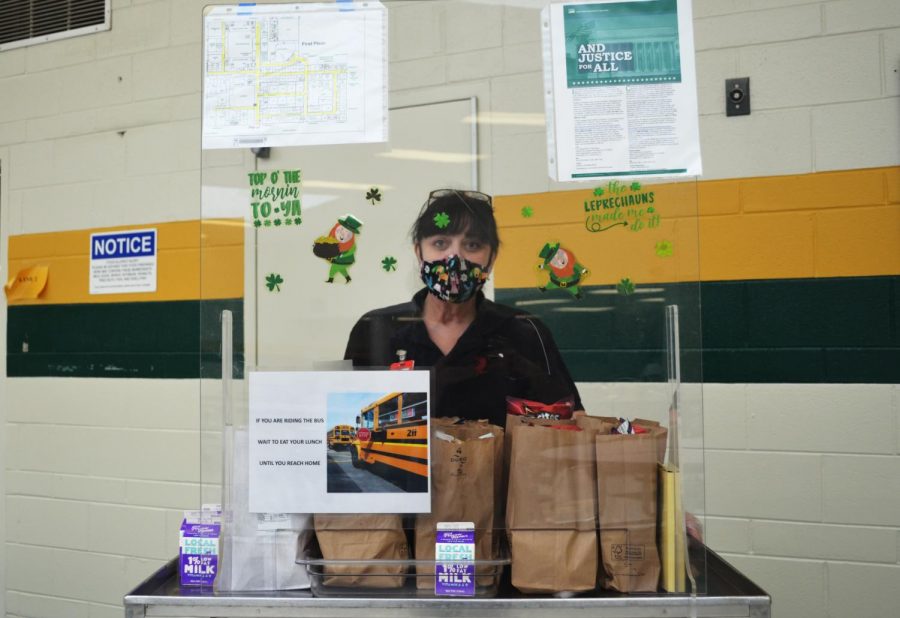Fueling Fremd: Meal distribution during pandemic
March 17, 2021
Despite an array of changes to learning during the pandemic, Fremd Food and Nutrition Services have worked continuously to assure students have the energy to learn.
Since March 13, 2020, Fremd has operated under emergency feeding measures and meal distribution. As a member of the National School Meal Program and the Summer Food Service Program, both funded by the United States Department of Agriculture (USDA), Fremd has been able to offer free meals to all kids in the community under 18.
Fremd offers free lunches and breakfasts on weekdays to students participating in the hybrid scenario. On average, 50 breakfasts and 165 lunches are passed out each day.
District 211 also offers curbside meal pick-up to families with children. Every Thursday evening from 4-5 pm, families have the opportunity to pick up meals for the next week. Every bag includes seven breakfasts, seven lunches, and a gallon of milk. The number of bags that can be picked up is based on the number of kids in a family.
As Fremd Nutrition Services plans their menus, federal guidelines are followed to assure that protein, fruit, vegetables, and whole grains are a part of each meal. The faculty puts an emphasis on including fresh food that caters to the preferences of families and students. In order to encourage pick-up, the food staff also includes a treat such as a cookie, bag of chips, fruit snacks, or goldfish within lunches to add a comforting touch to each bag.
District 211 Director of Food and Nutrition Services Stacey L. Lenihan explains the impact of community feedback when working on the program.
“We tailored our menu to what our families responded to that they wanted,” Lenihan said. “That was really important to us, to serve our community and what their needs were.”
In total, 1.4 million meals have been distributed across the district since the start of the pandemic. At the height of distribution in April, 5000 meal bags were picked up in a single week.
Fremd Food Service Manager Debbie Schmidt explains the gratification felt from serving the community.
“It’s all the distribution, whether we’re handing out the lunches, or we’re handing out breakfast,” Schmidt said. “It’s just getting to see all the students back in the school and, you know, some sort of normalcy.’’
Over the thousands of meals passed out, the Fremd food staff has had the opportunity to bond with many students and families within the community.
Schmidt shares her experience and interaction with families while distributing meals during curbside pick-ups.
“We’ve gotten to know quite a few of the families as they’re coming through,” Schmidt said. “We kind of know as soon as they’re coming exactly what they’re going to take because we’re so used to seeing them.”
When the new protocol first began, the Fremd Meal Service department had a surge in food requests. At first, the staff had to predict how many meals would be needed without knowing the exact demand. However, by using data from pick-ups, they’re now able to accurately predict how many meals are needed. From similar research, microwave instructions were also developed to make reheating meals more accessible.
Program participation from students has also varied as the learning scenario at Fremd shifts.
“More students are coming on site and we see that there are more of our kids participating in our program too,” Lenihan said. “We’re trying to make sure that everybody is aware that anybody who comes on site, any student is able to take a breakfast and a lunch,” Lenihan said.
Due to the pandemic, District 211 had to work very closely with its suppliers in order to effectively source food. Food manufacturers and transportation companies were limited in employees, which also affected the process of obtaining products.
According to Schmidt, the Food Services department is a very team-based program, and the staff had to adjust to the new safety regulations after being used to working closely together to pack bags and make meals. The requirements to stay 6-feet apart at first caused inconvenience for the food faculty work using assembly lines. However, they were able to set up an entire different food service model in the matter of a week.
“I think, for our food service staff, all of our staff work in this industry because they love our customers. They love working with our students, and we miss not seeing them, especially when we’re all remote,” Lenihan added.
As of March 5, the current emergency waivers extended by the USDA are valid through June 30. Summer Food Service Program will end on June 30 until further notice for any extension or changes to the program. However, the food staff will continue to work to distribute meals whether students are on or off site.
“It’s nice to know that if someone needs it, that we’re actually able to provide it for them,” Schmidt said.






